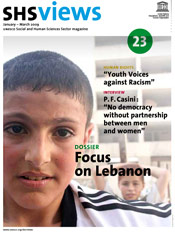| |
 |
 |
|
 |
 |
| SHSviews 23 |
| |
| UNESCO Social and Human Sciences Sector Magazine |
 |
| Dossier - Focus on Lebanon / Human Rights: “Youth Voices against Racism” / Interview with Pier Ferdinando Casini: “No democracy without partnership between men and women” – January-March 2009 (English | Français | Русский) |
 |
 Crisis [n.], from the Greek Krisis decision) Crisis [n.], from the Greek Krisis decision)
When, in the midst of the financial crisis, communities around the world are asked to help financial institutions and stock market speculators, this is called “crisis management”.
But if, at the same time, a bank announces its profits have doubled, recording a capital gain of 2 billion Euros, how do you call this? Some say: “These are the adverse effects of uncontrolled globalization.” Others say: “We have lost our marbles” or: “How many times have you been warned!” And finally, others dare to say: “There are alternatives available.” UNESCO has been saying for a long time now that we must humanize globalization.
In the Cambridge dictionary, there are, in fact, several definitions for the word “crisis”. No fewer than a dozen meanings, which all contain the same idea: that of a situation that has reached an extremely difficult or dangerous point; a time of great disagreement, uncertainty or suffering. And it would not be exaggerating to say that the economic crisis, which has reigned since late 2008, has never been felt with more brutal force from North to South. A brutality of awareness and a brutality of consequences.
The urgency is to react. Moreover, doesn’t the word “crisis” come from the Greek Krisis which means “decision” and refers to the idea of a key moment, forcing us to adopt a specific governance to get out of the state of disorder?
So, given the impact of the global financial crisis, which social policies should be adopted? What action should be taken? There is no miracle solution for 2009. Everyone knows this. It is now a question of breaking down the imaginary. 2009 requires us to be creative. The crisis is also an opportunity. But is “another world possible”, as the World Social Forum claims, the 8th edition of which, held in January, in Belem (Brazil), was a great success, bringing together some 133,000 participants, including five Heads of State?
According to the representative of one of the main NGOs involved: “The alternatives proposed can only be implemented in the real world once they have been integrated by the political world. The major obstacle is obviously that these global alternatives involve the overall agreement of all un Member States.” If there is one positive aspect to the crisis, it is this evidence which is shared by more and more people that we cannot escape from a state of crisis alone. Should it be regretted?
Decompartmentalizing the worlds of science, policy and civil society; linking the proposals that arise with the strategies implemented: these are the challenges, and they are also what UNESCO, through its Social and Human Sciences programme, endeavours to carry out every day, and can be read throughout this issue, to perhaps convince ourselves that hope remains in what the poet Paul Eluard wrote: “There is another world. It is within this one.”
Pierre Sané
Assistant Director-General of UNESCO
for Social and Human Sciences
This issue of SHSviews covers topical issues from January to March 2009:
Social and Human Sciences within National Commissions for UNESCO: Focus on Lebanon
After the Philippines, Canada, Malawi and Cuba, SHSviews goes, this trimester, to Lebanon where, in 1948, UNESCO’s Member States adopted the Universal Declaration of Human Rights, which made UNESCO the first agency of the United Nations system to recognize these fundamental rights. In this dossier:8 March 2009: International Women’s Day
Several articles in this issue of SHSviews are devoted to the activities set up in favour of women’s rights by the UNESCO Social and Human Sciences Sector.- An interview with the former President of the Inter-Parliamentary Union (IUP), Italian deputy Pier Ferdinando Casini, in which he underlines the importance of increasing the position of women in national parliaments since he believes that their participation in politics is changing political priorities all over the world.
- An article on two important meetings for women of the Great Lakes region of Africa, which will take place in Mombasa (Kenya), early April 2009, emphasizing how urgent it is to take action against violence towards women.
- The report on a conference on women’s participation in politics in the Caucasus, which took place in Derbent, in the Republic of Dagestan (Russian Federation).
- SHSviews n°23 also reports on two events, organized in Mongolia and Qatar, against violence towards women, as part of the 60th birthday of the Universal Declaration of Human Rights.
21 March 2009: International Day against Racism
Four pages are dedicated to UNESCO’s action against racism and discrimination.Also in this issue:
|
 |
 |
 Email this page Email this page  Printable version Printable version
|
 |
|
|


